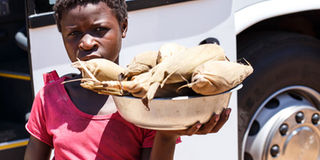Children putting bread on the table

Child food vendors are mostly said to be bread winners. Photo by Rachel Mabala
What you need to know:
CHILD LABOUR? We know that parents are supposed to provide for children. However, the trend is different lately. Children are sent out to to make a living from streets selling merchandise as Joseph Kato writes.
Namusoke lost her father when she was two years old. Due to financial predicaments, her mother took her to her paternal relatives in Mpigi District. When her aunt went for Christmas holiday last year, she brought her to Kampala and now they live together.
You will not miss her tiny frame carrying a basket of mangoes and avocados near Total fuel station on Ggaba Road. “Auntie ggula ku miyembe ne ova, (Aunt, buy some mangoes and avocado),” she persuades a passerby to make a sale. In a brief chat, I learn she is a Primary Four pupil at Kansanga Primary School. She lives with her aunt in Kiwempe, Makindye Division. On a good day she earns between Shs8,000 to Shs12,000 daily after school.
On asking about her aunt’s name; Namusoke declines: “My aunt told me to keep her details a secret for her security’s sake.”
Support parents and siblings
Similarly Nankya, a Primary Six pupil at Child Promotion School in Lugala, Kampala sells snacks at the railway in Namuwongo during holidays. The 12-year-old girl last saw her father in 2007. Since then, her mother has kept telling her that the father went to work and would return soon.
Nankya’s mother who prefers being called Maama Sarah says: “I last saw my child’s father seven years ago. I don’t know where he is now and why he left,” she whispers. “So, Nankya has to supplement the family income.”
Christine Napala is a dancer in Agwata Cultural Troupe, Kasangati lost her mother in 2010. And she took to Kampala streets. Napala was picked by the troupe director Jehosephat Kizito. Now in Primary Six, she uses her earnings to look after her father in Moroto District.
Florence Sanyuka, a Senior Three student at Kansanga Seed Secondary School sells cassava chips in addition to porridge in Namuwongo. She earns between Shs6,000 and Shs10,000 per day. She uses the money to pay her school fees and buy essentials for her young siblings.
She started working after realising that her mother could not raise funds to look after them. Her father passed on eight years ago yet the mother has no steady source of income.
Teach them skills
Sharon Tumusiime who operates a food stall in Wabigalo, a Kampala suburb, says teaching children to work is essential for their future. She bases her argument on her parents who taught her how to make snacks.
“I sold pancakes and got capital to start this food stall. I don’t blame parents who make children sell merchandise. After all, they are teaching them business and survival skills for the future,” she says.
Aggrey Matsiko, an accountant, disagrees with Tumusiime saying making children vend merchandise after school does not give them time to revise books thus leading to their poor performance.
“The child may decide to abandon school because of poor performance and work stress. I think parents are lazy. They are supposed to provide for their children. It is shameful when children provide for parents. I would not like to see that trending in our society,” says Matsiko.
Child labour?
Benjamin Waburoko, ECPAT Uganda Coordinator at Uganda Child Rights NGO Network (UCRNN) labels the act of making children sell merchandise as child labour which authorities should address urgently..
“It is high time government implemented the law against child labour. The law should hold accountable all employers of children including parents who have turned them into workers and bread winners,” he says.
There are two key issues Uganda faces in implementing the provisions in The Children Act. Uganda does not have the institutions or financial resources to fully implement the provisions in the Act.
Also, Probation and Welfare Officers are few and have no resources. Therefore, they cannot adequately solve the problems of the child and his or her family.
“Some parents have lost morale of educating their young children because their elders have failed to secure jobs. Other children leave school because they study in harsh weather conditions and poor infrastructures including toilets,” says Waburoko.
Police take
Patrick Onyango, Kampala Metropolitan police spokesperson, warns parents against turning children into bread winners saying it is illegal and risky to their life.
“Parents should provide for their children. It is their role to look after the children but not vice versa. Letting children vend merchandise at 6pm exposes them to rapists, killers, traffickers and kidnappers for ransom,” warns Onyango.
Onyango’s caution goes in hand with the April 29 incident where police in Kampala recovered the body of a 14-year-old girl Rehema Nassali, apupil of Buganda Road Primary School who is suspected to have been raped before being murdered by unknown assailants and dumped on Yusuf Lule road.
Nassali used to hawk bananas after school on Yusuf Lule Road where she met her death. The public put the blame to the lack of security lights on Yusuf Lule road, giving room to criminals to attack innocent citizens.




